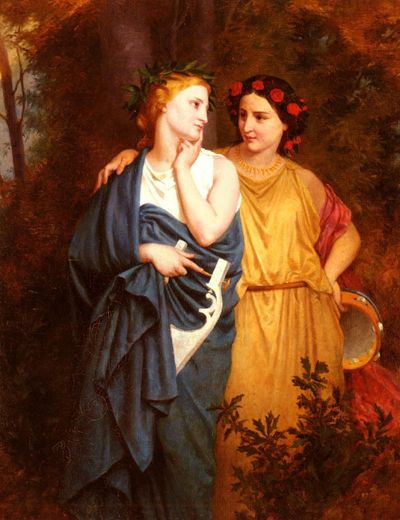But desperation can indeed invent;
in misery the mind is keen. She hangs
a web upon a crude—a Thracian—loom
and, on a white background, weaves purple signs:
the letters that denounce the savage crime.
When that is done, she gives her serving woman
the cloth—she’s rolled it up—and, gesturing,
asks her to bring it to the queen. As bid,
but ignorant of what the message is,
the serving woman takes the cloth to Procne.
The savage tyrant’s wife, unrolling it,
soon reads her sister’s tale, the dread misdeed,
and then—a fact that cannot be believed—
she does not speak: her mouth is blocked by grief.
Her tongue seeks words of scorn to match her wrath
but does not find them. Nor does Procne weep:
she sinks into herself, imagining
both licit and illicit penalties
she could inflict; revenge is what she needs.
—Book VI, The Metamorphoses of Ovid, Allen Mandelbaum trans.
If this project began anywhere, it began here, with Elizabeth Gardner Bouguereau’s painting of Philomela and Procne. I had studied Ovid as part of my undergraduate thesis, but somehow I had missed their story. To me, this painting shows them before Procne’s marriage, which is to say before it all goes horribly, nightmarishly wrong. To contrast the sisters here – their liveliness, their intimacy, their personalities so evident in their body language – with the violence that will come gives this painting an incredible power. When I first saw it, I didn’t know what to say or do in response; I just kept coming back to it in my mind.


